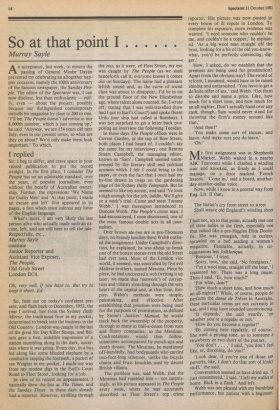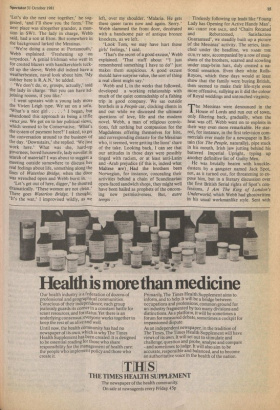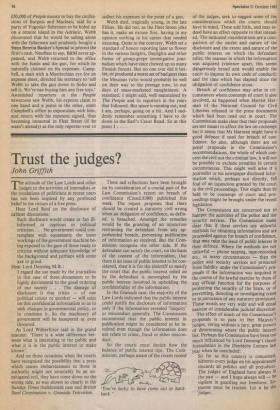So at that point I. • • • • •
Murray Sayle
An acceptance, last week, to mourn the passing of General Moshe Dayan prevented my celebrating an altogether happier occasion, namely the 100th anniversary of the famous newspaper, the Sunday People. The editor of the Spectator was, I can now disclose, less than enthusiastic — sniffy, even — about the project, possibly because our distinguished contemporary outsells his magazine by close to 200 to one. 'I'll bet The People doesn't advertise in our 8,000th number, which is just coming up,' he said. 'Anyway, we are 154 years old next July, even in our present series, so what are they on about? We'd only make them look important.' To which,
I replied
Sir: I beg to differ, and crave space in your valued publication to put the record straight. In the first place, I consider The People has set an admirable standard, over the years, of popular journalism, even without the benefit of Australian ownership. Further, the expressions 'We Name the Guilty Men' and 'At that point, I made an excuse and left' first appeared in its pages, a fact which must interest any lover of the English language.
What's more, I am very likely the last person alive who actually made such an excuse, left, and am still here to tell the tale. Respectfully, etc.,
Murray Sayle onetime Junior Reporter and Assistant Vice Exposer, The People, Old Grub Street London EC4.
Oh, very well, if you have to. But try to keep it short. Ed.
So, fade out on today's confident present, and flash back to December, 1952, the year I arrived, hot from the Sydney Daily Mirror, the traditional fiver in my pocket, determined to break into the business in the Old Country. London was caught in the last of the great Six Day Killer Smogs, and Britain gave a first, indelible impression of a nation stumbling along in the dark, uncertain where it was going. Every day, in a bus led along like some blinded elephant by a conductor tapping the footpath, a packet of ten Weights in my pocket, I made my way from my modest digs in the Earl's Court Road to Fleet Street, looking for a job.
In view of its record on appeasement, I naturally drew the line at The Times, and the Sunday Times in those days already had a reporter. However, strolling through the zoo, as it were, of Fleet Street, my eye was caught by The People (as we shall henceforth call it; everyone knows it comes out on Sundays). The name had a pleasant leftish sound and, as the curse of social class was about to disappear, I'd be in on the ground floor of the New Elizabethan age, where talent alone counted. So, I wrote off, stating that I was well-travelled (how had I got to Earl's Court?) and spoke fluent Urdu (our ship had called at Bombay). I was not surprised to get a letter back proposing an interview the following Tuesday.
In those days The People offices were in Covent Garden, at the top of Bow Street, both places I had heard of. I couldn't say the same for my interviewer, one Renton Stuart Campbell, the managing editor, known as 'Sam'. Campbell seemed unimpressed by the literary skill and political acumen which I felt I could bring to his paper, or even the fact that I once had my by-line drawn in twigs on the gardening page of the Sydney Daily Telegraph. But he seemed to like my accent, and said 'Ye look tough enough for the job, laddie. We'll give ye a week's trial. Come and meet Tommy Webb.' I was thereupon introduced to Duncan Webb, The People's crime man. I had encountered, I soon discovered, one of the most famous double acts in all journalism.
Over brown ale (we are in pre-Thomson days, no brandy lunches then) Webb outlined the assignment. Under Campbell's direction, he explained, he was about to break one of the hottest stories even the old Street had ever seen. Most of the London vice world, it seemed, was controlled by five evil Maltese brothers, named Messina. Piece by piece, he had uncovered a web (writing it up later, we made that 'network') of corruption and villainy stretching through the very heart of the capital and, at that time, Empire. Webb's methods were simple, painstaking, and effective. After establishing that premises were being used for the purposes of prostitution, as defined by Stone's Justices' Manual, he would track back the ownership of the property, through as many as half-a-dozen front men and flimsy companies, to the Messinas. Confrontations would then follow, sometimes accompanied by punch-ups and death threats. The Messinas, he mentioned off-handedly, had bodyguards who carried two-foot-long stilettoes, unlike the bicycle chains and brass knuckles used by decent British villains.
The problem was, said Webb, that the Messinas had rumbled him — not surpris ingly, as his picture appeared in The People every week, where he was accurately described as Fleet Street's top crime reporter. His picture was now posted in every house of ill repute in London. To complete his exposure, more evidence was wanted. 'I need someone who couldn't be me, and couldn't be a copper,' he explained. 'As a big wool man straight off the boat, looking for a bit of the old you-knowwhat, you'd be perfectly convincing, digger.'
How, I asked, do we establish that the premises are being used for prostitution? Apart from the obvious way? The sword of reform, I assumed, would have to be raised shining and untarnished. 'You have to get a definite offer of sex,' said Webb. 'Get them to disrobe and name a price. Like, how much for a short time, and how much for an all-nighter, Don't actually hand over any cash, though. Sam would never stand for throwing the firm's money around like that.'
'And then?'
'You make some sort of excuse, and leave. And make sure you do leave.' `Oh.'
My first assignment was in Shepherds Market. Webb waited in a nearby ABC Tearooms while I climbed a winding stair and knocked, as firmly as I could manage, on a door marked 'French lessons.' Come in,' said a bored, anotherday-another-dollar voice.
Now, while I knew in a general way from Eng. Lit. II that, The harlot's cry from street to street Shall weave old England's winding sheet I had not, up to that point, actually met one of these ladies in the flesh, especially one that talked like a pre-Higgins Eliza Doolittle. She was youngish, hair in curlers, sprawled on a bed reading a women's magazine. Fanciable, actually, in circumstances less folklorique.
'Bonjour,' I tried.
'Sorry, love,' she said. 'No foreigners.'
'I'm a wool man, straight off the boat,' I reassured her. There was a long pause. Then I said, 'Er, how much?'
'For what, dear?'
'How much a short time, and how much an all-nighter?' While, of course, people do perform the danse de Treves in Australia, these particular terms are not currently in use, and I may have sounded unconvincing.
'It depends,' she said wearily, 'on whether you're a regular or not.'
'How do you become a regular?'
,By coming here regularly, of course.' She used a pitying tone, as to someone a strawberry or two short of the punnet. 'You don't . . . I said, 'you don't feel like, er, disrobing, do you?'.
'Look dear, if you're one of those sex perverts, like, I don't do that sort of kinkY stuff,' vsehres asaid.ti o n c seemed to have dried up. `I just remembered,' I said. 'I left my wallet at home. Back in a flash.' And left.
Webb was not pleased with my bumbling performance, but patient with a beginner. `Let's do the next one together,' he suggested, `and I'll show you the form.' The next place was altogether grander, a mansion in SW!. The lady in charge, Webb said, had a son at Eton. But somewhere in the background lurked the Messinas.
`We're doing a course at Portsmouth,' Webb explained. `Freshening up on torpedoes.' A genial Irishman who went in for crested blazers with handkerchiefs tucked up the sleeve, Webb did indeed have a weatherbeaten, naval look about him. `My cobber here is R.A.N,' he added.
`We don't do, er, groups, actually,' said the lady in charge. `But you can have adjoining rooms, if you like.'
I went upstairs with a young lady more the Vivien Leigh type. We sat on a sofa.
`What's a nice girl ' I began, but abandoned this approach as being a trifle vieux jeu. We got on to her political views, Which seemed to be Conservative. 'What's the system of payment here?' I asked, to get the conversation around to the business of the day. `Downstairs,' she replied. `We just work here.' What was she, hard-up governess, bored housewife, lady novelist in search of material? I was about to suggest a meeting outside somewhere to discuss her real feelings about life, something along the lines of Waterloo Bridge, when the door was wrenched open and Webb burst in.
`Let's get out of here, digger,' he shouted dramatically. `These women are not clean.' There goes Waterloo Bridge, I thought. 'It's the war,' I improvised wildly, as we left, over my shoulder. `Malaria. He gets these queer turns now and again. Sorry.' Webb slammed the front door, decorated with a handsome pair of antique bronze knockers, as we left.
`Look Tom, we may have hurt those girls' feelings,' I said.
`That's the secret of a good excuse,' Webb explained. `That stuff about "I just remembered something I have to do" just makes them suspicious. A good excuse should have surprise value, the sort of thing a real client might say.'
Webb and I, in the weeks that followed, developed a working relationship with much of the quiet comradeship of a fishing trip in good company. We sat outside brothels in a People car, clocking clients in and out while we discussed the ultimate questions of love, life and the modern novel. Webb, a man of religious convictions, felt nothing but compassion for the Magdalenes offering themselves for hire, and corresponding distaste for the Messinas who, it seemed, were getting the lions' share of the take. Looking back, I can see that our attitudes in those days were possibly tinged with racism, or at least anti-Latin and -Arab prejudice (if this is, indeed what Maltese are) . Had the brothers been Norwegian, for instance, concealing their activities behind a chain of Scandinavian open-faced sandwich shops, they might well have been hailed as prophets of the oncoming new permissiveness. But, autre temps . . . Tirelessly following up leads like `Young Lady has Opening for Active Handy Man', BIG CHEST FOR SALE, and `Chairs Recaned and Rebottomed, Satisfaction Guaranteed', we steadily built up a picture of the Messinas' activity. The series, launched under the headline, WE NAME THE GUILTY MEN, accompanied by a row of mugshots of the brothers, scarred and scowling under snap-brim hats, duly created a national sensation. Even their white RollsRoyces, which these days would at least show that the family were buying British, then seemed to make their life-style even more offensive, sullying as it did the colour of Royal weddings and untouched virginity.
The Messinas were denounced in the House of Lords and run out of town, only filtering back, gradually, when the heat was off. Webb went on to exploits in their way even more remarkable. He starred, for instance, in the first television commercials ever made for a newspaper in Britain (for The People, naturally), pipe stuck in his mouth, Irish jaw jutting behind his battered Imperial Upright, typing up another definitive list of Guilty Men.
He was brutally beaten with knuckledusters by a gangster named Jack Spot, not, as it turned out, for threatening to expose him, but in a literary discussion over the first British Serial rights of Spot's confessions, I Am The King of London's Underworld, which Webb had ghostwritten in his usual workmanlike style. Sent with f50,000 of People money to buy the confessions of Burgess and Maclean, said by a party of Yugoslav fishermen to be holed up on a remote island in the Adriatic, Webb discovered that he would be sailing alone with the fishermen and prudently bought a 9mm Beretta Banker's Special to protect the firm's cash. Needless to say, B&M never appeared, and Webb returned to the office with the funds and the gun, for which he naturally claimed on his expenses. Campbell, a man with a Murdochian eye for an expense sheet, directed his secretary to 'tell Webb to take the gun down to Soho and sell it. We're nae buying him any free toys.' Astonished reporters in the People newsroom saw Webb, his expense claim in one hand and a pistol in the other, enter Campbell's office to expostulate with him, and return with his expenses signed, thus becoming immortal in Fleet Street (if he wasn't already) as the only reporter ever to collect his expenses at the point of a gun.
Webb died, tragically young, in the late Fifties. He did not, as the Fleet Street joke has it, make an excuse first, having in my opinion nothing in his career that needed excusing. Quite to the contrary, Webb set a standard of honest reporting later to flower in the various Insights, Daylights and other forms of group-grope investigative journalism which have since chewed up so many Finnish forests. But no one ever did it better, or produced a worse set of bad guys than the Messinas (who would probably be well on their way to the peerage now, in our days of mass-marketed naughtiness). A standard, I might add, well maintained by The People and its reporters in the years that followed. But space is running out, and I am, perhaps, going on a bit. And I suddenly remember something I have to do down in the Earl's Court Road. So at this point I. . . .








































 Previous page
Previous page